|
|
|
Sort Order |
|
|
|
Items / Page
|
|
|
|
|
|
|
| Srl | Item |
| 1 |
ID:
193143
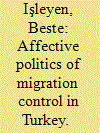

|
|
|
|
|
| Summary/Abstract |
There is an increasing call for addressing the Eurocentrism of research on the external dimension of European Union (EU) migration and border policies and practices. A growing body of work attempts to remedy the discipline’s Eurocentrism through postcolonial theory. This article argues that more needs to be done to unsettle the Eurocentrism of migration studies with regard to the question of non-EU political subjectivity. The article adopts an alternative conception of subjectivity, which looks at the “affective” dimension of international relations. Through a close engagement with postcolonial studies on the question of political subjectivity, the article underscores the significance of history and historical relationships in constituting an affective politics of borders and migration in the non-EU world. The argument is illustrated through an empirical focus on Turkey. Drawing on interviews with Turkish border officials, the article aims to contribute to the literature in two ways. First, it argues that affective attachments shape how Turkish actors perceive and attribute meaning to national borders and human mobility across the national territory. Second, and relatedly, Turkish actors’ identification with and positioning towards the EU’s migration control regime are products of affective attachments rooted in historical experiences and encounters with Europe.
|
|
|
|
|
|
|
|
|
|
|
|
|
|
|
|
| 2 |
ID:
184136
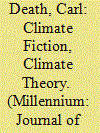

|
|
|
|
|
| Summary/Abstract |
The international politics of climate change invokes the imagination of various potential global futures, ranging from techno-optimist visions of ecological modernisation to apocalyptic nightmares of climate chaos. This article argues that most dominant framings of the future in climate policy imaginaries tend to be depoliticised and linear visions of universal, homogenous time, with little spatio-temporal or ecological plurality. This article aims to convince IR scholars of climate politics that Africanfuturist climate fiction novels can contribute to the decolonisation of climate politics through radically different socio-climatic imaginaries to those that dominate mainstream imaginations of climate futures. The Africanfuturist climate fiction novels of authors such as Nnedi Okorafor, Lauren Beukes and Doris Lessing imagine different spaces, temporalities, ecologies and politics. Reading them as climate theory, they offer the possibility of a more decolonised climate politics, in which issues of land and climate justice, loss and damage, extractive political economies and the racialised and gendered violence of capitalism are central.
|
|
|
|
|
|
|
|
|
|
|
|
|
|
|
|
| 3 |
ID:
102729
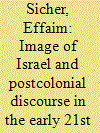

|
|
|
|
|
| Publication |
2011.
|
| Summary/Abstract |
The essay looks at three spheres in which ideological bias and political activism work to delegitimize the State of Israel by maligning Israel and Zionism in mainstream British public discourse. Postcolonial theory is one weight against any objective treatment of the Jewish state. The demonization of Israel in the press draws on conspiracy theories and stereotypes familiar from anti-Semitic tropes. British Jews are fairly supportive of Israel, though divided on solutions to the Arab-Israel conflict, however a small group of anti-Zionist Jews assert their moral stance "as Jews" by defaming Israel's allegedly criminal activities. The analysis of public discourse in Britain in the first decade of the twenty-first century raises disturbing questions about the complex relationship between the anti-Israel campaign and latent anti-Semitism on the left and the right, and draws attention to the local context of race relations as well as the global Jihad against Israel and the West.
|
|
|
|
|
|
|
|
|
|
|
|
|
|
|
|
| 4 |
ID:
155136
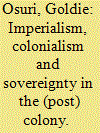

|
|
|
|
|
| Summary/Abstract |
Examining a classic formulation of the relationship between colonialism and postcolonial nationalisms in postcolonial theory, as well as its recent critiques, this article puts forward a thesis that contemporary colonialisms and imperialisms may be best diagnosed through the lens of identifying forms of sovereignty rather than relying on the geopolitical framework of West/non-West recognisable in the conceptual vocabulary of postcolonial theory. Focusing on the disputed issue of Indian sovereignty over Kashmir, this essay asks the following questions: What forms of occupation by postcolonial nation-states remain concealed by ways in which extant postcolonial approaches assume geopolitical divisions? Why is it necessary to rethink the parameters of imperialism and colonialism for a contemporary era?
|
|
|
|
|
|
|
|
|
|
|
|
|
|
|
|
| 5 |
ID:
173879
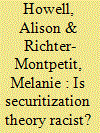

|
|
|
|
|
| Summary/Abstract |
This article provides the first excavation of the foundational role of racist thought in securitization theory. We demonstrate that Copenhagen School securitization theory is structured not only by Eurocentrism but also by civilizationism, methodological whiteness, and antiblack racism. Classic securitization theory advances a conceptualization of ‘normal politics’ as reasoned, civilized dialogue, and securitization as a potential regression into a racially coded uncivilized ‘state of nature’. It justifies this through a civilizationist history of the world that privileges Europe as the apex of civilized ‘desecuritization’, sanitizing its violent (settler-) colonial projects and the racial violence of normal liberal politics. It then constructs a methodologically and normatively white framework that uses speech act theory to locate ‘progress’ towards normal politics and desecuritization in Europe, making becoming like Europe a moral imperative. Using ostensibly neutral terms, securitization theory prioritizes order over justice, positioning the securitization theorist as the defender of (white) ‘civilized politics’ against (racialized) ‘primal anarchy’. Antiblackness is a crucial building-block in this conceptual edifice: securitization theory finds ‘primal anarchy’ especially in ‘Africa’, casting it as an irrationally oversecuritized foil to ‘civilized politics’. We conclude by discussing whether the theory, or even just the concept of securitization, can be recuperated from these racist foundations.
|
|
|
|
|
|
|
|
|
|
|
|
|
|
|
|
| 6 |
ID:
108091
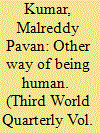

|
|
|
|
|
| Publication |
2011.
|
| Summary/Abstract |
This essay articulates the ways in which the Indigenous People's Movement leading to the United Nations Declaration on the Rights of the Indigenous Peoples (2007) succeeds in what postcolonial theory has conventionally set out to emancipate, but has failed to do. Postcolonial theory challenges all eurocentric and liberal humanist discourses on rights which place the Western subject as the ideal subject figure of all histories and societies, and appeals for a language that would articulate other ways of being human and humanist. Yet recent trends in postcolonial theory have come to embrace the language of cosmopolitanism and humanism as viable alternatives for a postcolonial future. Drawing upon the principle thematic of the UN Declaration on the Rights of the Indigenous Peoples, the article suggests that the Declaration provides an alternative to postcolonial theory's revisionist humanism-the re-cognition of difference. As part of the international legal discourse, the Declaration is particularly noted for its political victory in the legitimisation of collective rights in postcolonial societies. Furthermore, as the Universal Declaration of Human Rights (1948) remains an integral part of the collective rights of the Indigenous Peoples, the article suggests that the Indigenous People's Movement succeeds in negotiating a language that would legitimise other ways of being human without being adversarial or antithetical to euro-humanism.
|
|
|
|
|
|
|
|
|
|
|
|
|
|
|
|
| 7 |
ID:
110481
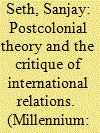

|
|
|
|
|
| Publication |
2011.
|
| Summary/Abstract |
This article in three parts offers the beginnings of a postcolonial critique of mainstream International Relations (IR). The first part argues that IR, where it has been interested in history at all, has misdescribed the origins and character of the contemporary international order, and that an accurate understanding of the 'expansion of the international system' requires attention to its colonial origins. The second part suggests that IR is deeply Eurocentric, not only in its historical account of the emergence of the modern international order, but also in its account(s) of the nature and functioning of this order. The human sciences are heirs to a tradition of knowledge which defines knowledge as a relation between a cognising, representing subject and an object, such that knowledge is always 'of' something out there, which exists independently of its apprehension. The third part of the article suggests that knowledges serve to constitute that which they purport to merely cognise or represent, and that IR theory serves to naturalise that which is historically produced.
|
|
|
|
|
|
|
|
|
|
|
|
|
|
|
|
| 8 |
ID:
167642
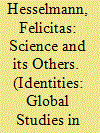

|
|
|
|
|
| Summary/Abstract |
This article investigates the current discourse about scientific misconduct from a postcolonial perspective. It traces the development of a causal story about scientific misconduct, blaming misconduct on so-called foreign scientific cultures said to be most prevalent among developing countries. The paper attempts to show how the discourse on misconduct is structured by themes and logics of coloniality as well as diverges from them, exhibiting shifting categorisations and images of the Other, which oscillate between the Other as a backwards savage and the Other as an advanced machine. Such contradictory categorisations will be argued to be both interpretable as movements to abandon prevailing ideologies of efficiency and progress within science and to make science more inclusive as well as means to uphold and re-establish existing patterns of coloniality in the face of historical changes both within and outside of academic research.
|
|
|
|
|
|
|
|
|
|
|
|
|
|
|
|
| 9 |
ID:
189877
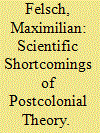

|
|
|
|
|
| Summary/Abstract |
In the social sciences, there is a trend towards normative, identity based and activist understanding of science. This trend is particularly evident in the rise of postcolonial theory. This paper critically engages with its impact in International Relations. Postcolonial theory aims to challenge established methodologies and arguments in all social science disciplines but shows little interest in rigorous research and the production of scientific knowledge. This paper highlights the most fundamental flaws of postcolonial theory, such as ideological bias, the application of blurred and one-sided concepts, the preference for anecdotal evidence over empirical evidence and ignorance of the major social and political trends of our time. Subsequently, it is argued that postcolonial theory contributes to a distorted perception of reality. Perhaps, this article can stimulate a debate about the function and scientific nature of social sciences at a time when feelings and emotions, not facts, increasingly dominate academia.
|
|
|
|
|
|
|
|
|
|
|
|
|
|
|
|
| 10 |
ID:
091734
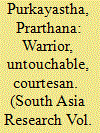

|
|
|
|
|
| Publication |
2009.
|
| Summary/Abstract |
This article analyses the intimate links between dance and the processes of national and postcolonial identity formation in India, particularly in Bengal, in the twentieth century. It examines alternative, non-classical artistic experiments in the realm of theatre dance spawned by twentieth century cultural nationalism in India, focusing on dancing bodies that actively engaged with, and wrote different meanings for, the socio-political space they inhabited. Dance-dramas written by Rabindranath Tagore in the 1930s are used as points of entry into a discourse on South Asian modernism and feminism, opening up a space in which the twentieth century representation of Indian women through bodily performance troubles notions of cultural purity and origin and offers instead 'impure' but nevertheless powerful cultural texts.
|
|
|
|
|
|
|
|
|
|
|
|
|
|
|
|
| 11 |
ID:
193141
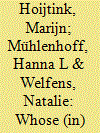

|
|
|
|
|
| Summary/Abstract |
Building on feminist and postcolonial theoretical approaches across International Relations (IR) and security studies, this Special Issue advances an emerging research agenda within EU studies by shedding light on the gendered and racialised logics of EU security and their links to colonial histories and practices. Together, the contributions to this Special Issue demonstrate how EU security is intrinsically connected to and constituted by histories of colonialism, racism and patriarchy. At the same time, they also highlight how the colonial, racialised and gendered dynamics that underpin EU security and that are mobilised by the EU, its institutions and member states are always complex and shifting. Importantly, they do so by decentring our analysis of EU security moving our focus often away from the EU and towards different, somewhat unexpected sites and geographical locations of EU security. The current war in Ukraine underwrites the need for more historical, contextual and decentred work on EU security, while also highlighting the necessity to reflect on dominant practices of knowledge production and the experiences of people living in and with war through a feminist and postcolonial lens.
|
|
|
|
|
|
|
|
|
|
|
|
|
|
|
|
|
|
|
|
|